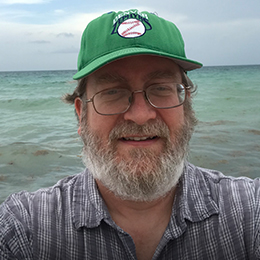John Young
 Why did you choose Northwestern?
Why did you choose Northwestern?
I realized late in my senior year at Princeton, while completing my thesis, that I wanted to pursue an academic career in English rather than one in journalism, as I had imagined until then. Alexandra Bradner, who was a year behind me at Princeton and from Highland Park, suggested I apply to Northwestern for an MA. I fell in love with literature again during my MA year (and with Alexandra along the way) and continued into the PhD program. Alexandra completed her doctorate in philosophy from Northwestern in 2005, the year after our first child was born.
How would you describe your research and/or work to a non-academic audience? What was it then and/or what it is now?
My dissertation focused on the relationships between modernist women writers, especially Virginia Woolf and Gertrude Stein, and the predominantly male publishing industry of the early 20th century. Woolf and Stein managed to retake some control over that process by publishing themselves, Woolf with her husband Leonard through the Hogarth Press, and Stein with her wife (as she called her) Alice B. Toklas, through the Plain Edition. Since then I have shifted my focus to the impact of the largely white publishing industry on Black writers, from the 1910s to the present.
Tell us who or what inspired your research and/or work.
My dissertation director, Christine Froula, was a student of Jerome McGann. In addition to serving as a model of scholarly rigor and breadth, Christine turned me on to McGann's book The Textual Condition (1991), in which he argues that bibliographic codes (the material presentation of a text in book, magazine, or now digital form) is equally important as its linguistic codes (its verbal content). That insight has propelled most of my scholarly career, including my first book (Black Writers, White Publishers, 2006) and my second book (How to Revise a True War Story, 2017, on Tim O'Brien), as well as my professional service (I recently completed an 11-year term as executive director of the Society for Textual Scholarship, an organization founded in the early 1980s, when McGann's ideas were beginning to revolutionize editorial theory and practice).
What are you most proud of in your career to date?
I have spent almost my entire career (starting in 2000) at Marshall University, a regional state institution in West Virginia, which recently achieved R-2 status. I'm most proud of the impact I've been able to have on the lives of many students at Marshall, who are often first-generation and/or from radically underprepared academic backgrounds. I'm also proud to have maintained a career as a scholar while typically teaching a 4/4 load.
Tell us about a current achievement or something you're working on that excites you.
My current book project is tentatively titled The Seeds of Cane: Jean Toomer and American Magazine Modernism, on the range of "little magazines" in which Toomer was publishing before Cane, one of the great works of the Harlem Renaissance, appeared in 1923. This project combines my ongoing interests in the intersection of textual scholarship and Black studies, along with a more recent foray into periodical studies. If all goes well, the book will come out from the University of Iowa Press series Studies in the Art, Culture, and Future of Books in 2022/23.
What advice would you give your younger self or someone considering a similar path?
A PhD in the humanities is a life-changing experience, but only worth pursuing for that reason. There may or may not be a career as a professor at the end of the tunnel, but it will be worth it if you truly care about the life of the mind.